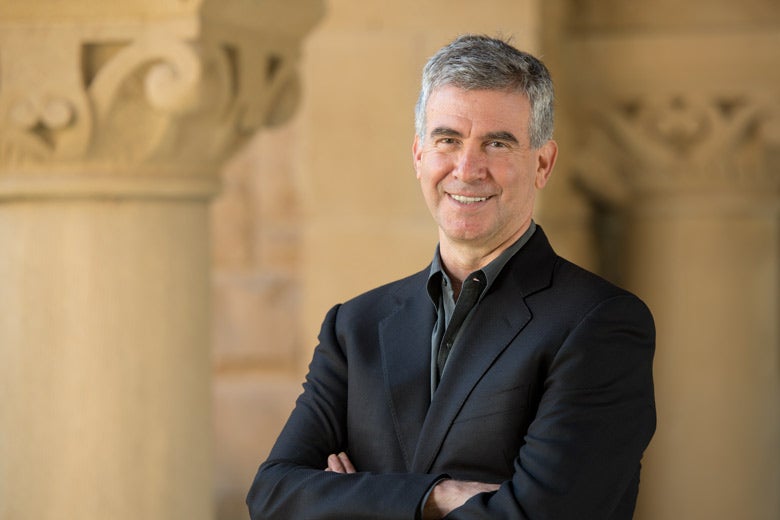
Professor Daniel Schwartz, an expert in human cognition and educational technology, has been a member of the Stanford faculty since 2000. (Image credit: L.A. Cicero)
Professor Daniel Schwartz, an expert in human cognition and educational technology, has been named the next dean of Stanford University Graduate School of Education, Provost John Etchemendy announced Wednesday.
A member of the Stanford faculty for 15 years, Schwartz oversees a laboratory that develops teaching and learning technologies. His extensive teaching background in diverse settings includes years spent teaching reading and math to adolescents in urban and rural communities. Among many honors, he was named Graduate School of Education Teacher of the Year for 2015.
Schwartz will assume his post leading Stanford Graduate School of Education (GSE) on Sept. 1. He succeeds Deborah Stipek, who has served as dean for the past two years after a previous tenure of a decade leading the school.
“Dan Schwartz will bring incredible depth, academic experience and knowledge of human learning as dean of one of the nation’s great education schools,” Etchemendy said. “Dan has a strong understanding of the school’s role in working to improve one of the world’s most critical needs – education. He will provide great support and guidance to faculty and students as they work to advance learning.”
Schwartz said his appointment is “an exceptional honor.”
“The GSE is known for its exciting breakthroughs, and its unrivaled scholarship and practice. The GSE is a world leader in elevating the promise of education for children, families and nations,” Schwartz said. “Serving as dean provides a rare opportunity to help Stanford, the GSE and our students work creatively to improve schooling, an institution at the center of so many people’s daily lives and future dreams.”
Schwartz joined the Stanford faculty in 2000. His academic focus is to understand how people learn and how to create improved learning environments, including the role of creativity in learning and how computer technologies can be used to assist learning. Schwartz’s laboratory has produced new computer-focused methods of science and math instruction, which in turn permit original research into fundamental questions of learning and education.
“Dan Schwartz is an outstanding choice for the next dean of the Graduate School of Education. He knows educational research; he knows life in schools; and he knows the GSE. He understands how research and teaching in the GSE complement one another,” said Professor Emeritus Edward Haertel, co-chair of the search committee. “He is a wise and creative social scientist who will work to support the diversity of our GSE community and our multiple approaches to addressing the challenges of educational theory, policy and practice.”
With more then 400 graduate students, the GSE is a leader in cross-disciplinary research that helps shape educational practice and policy. The school’s faculty members integrate practice and research by working collaboratively with education administrators, teachers and policy leaders around the world, and they contribute to theoretical and methodological innovations in the social sciences.
Graduates of the GSE hold leadership positions as teachers, researchers, administrators and policymakers. The school’s philosophy is to expose its graduates to real-world challenges and involvement in problem-solving collaborations with practitioners and policymakers, in order to improve education outcomes around the world.
“Students today face a future that is likely filled with changing careers, opportunities for social mobility and demanding advances in science and technology. In the meantime, they are being prepared with models of instruction and assessment that emphasize routine mastery, not adaptation,” Schwartz said. “For them, the question will not involve their training in past facts, but, rather, their preparedness to learn new ones.”
Schwartz’s research emerged after many years of teaching in challenging classroom settings. He has taught math at a day school in rural Kenya, English in a south-central junior high school in the Los Angeles Unified School District, and math, science, reading and language arts to junior high and high school students in the rural village of Kaltag, Alaska.
Schwartz holds the Nomellini & Olivier Professorship in Educational Technology at Stanford. With his lab, he has designed numerous computerized instructional tools, including teachable agents, choice-based assessments and a pre-school mathematics program called Critter Corral. He is the author of numerous landmark papers on the transfer of learning and the role of perception in higher-order cognition. His current book that translates the science of learning into practice, The ABCs of How We Learn: 26 Scientifically Proven Approaches, How They Work and When to Use Them, will be published in early 2016.
Before arriving at Stanford, Schwartz was a professor of psychology and human development at Vanderbilt University. He holds a doctorate in human cognition and learning and a master’s degree in computers and education from Columbia University. He earned his teaching credential from the University of Southern California and his bachelor’s degree in philosophy from Swarthmore College.
Media Contacts
Jonathan Rabinovitz, Graduate School of Education: (650) 724-9440, jrabin@stanford.edu